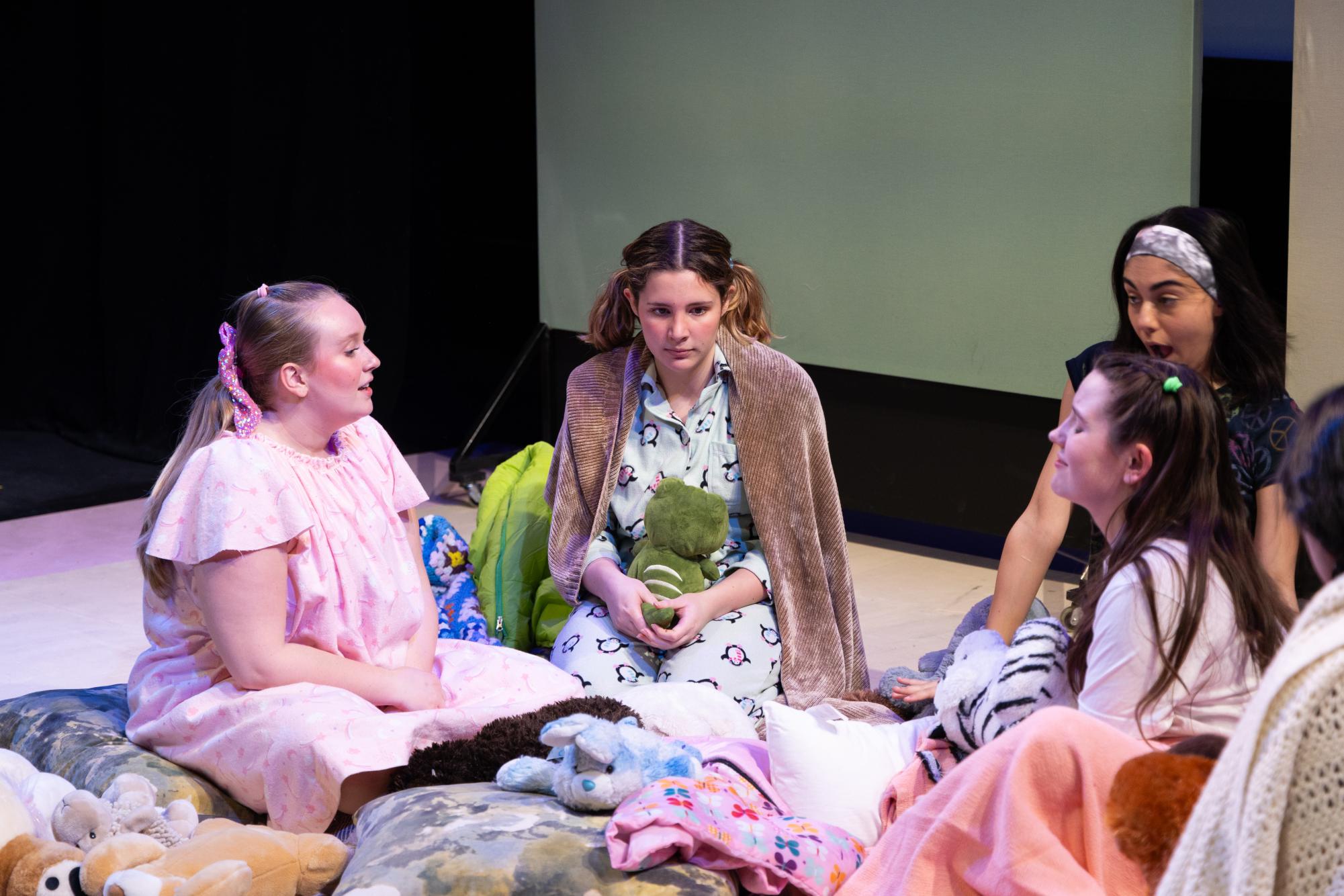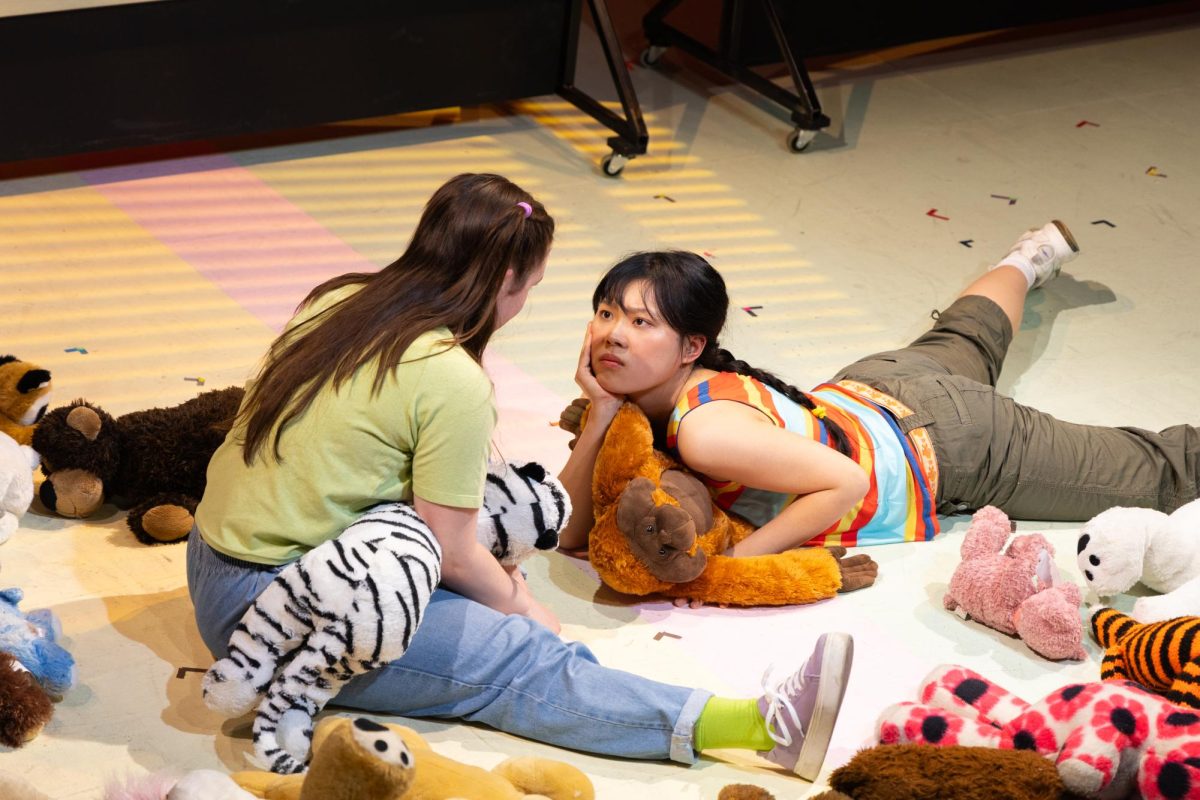“Usual Girls” is by no means a typical feel-good, light-hearted play about womanhood. At times, it’s a comedy, but with every laugh it delivers, a harsh reality follows.
Playwright Ming Peiffer describes it as “a show about the joys and horrors of growing up being a woman — the extreme joys and the extreme horrors,” and to that end, it succeeds. Samantha Richert Boehm, an assistant teaching professor in the theatre department, directed Northeastern’s March 28-April 7 production of “Usual Girls,” bringing Peiffer’s play and its stark message to a new audience.
The play follows Kyeoung (Cecilia Liang), an Asian American woman, from childhood into adulthood, chronicling her experiences with sexuality and how they lead to ostracization and objectification. Right from the opening scene, Kyeoung is discriminated against when Rory (Jude Riley), a boy whom she goes to school with, bullies her on the playground. After hearing Kyeoung and her friends talking about sex, Rory threatens to tell the teacher unless her friends kiss him. When Kyeoung volunteers to kiss him to protect her friends, Rory calls her slurs and makes racist comments about her eyes and vagina.
Earlier scenes such as this have more of an interplay between comedy and drama. Most of the dialogue consists of jokes at Rory’s expense, and while his comments are deeply hurtful, the true consequences of the societal issues they underscore aren’t fully shown until later on. As Kyeoung and her friends grow up and their understanding of these issues develops, the blistering truths reach the forefront of the narrative.
“It’s very raw and very vulgar, and I think, in a way, how we have communicated to the audience and how they reacted really speaks to how shocked they are about these words and the ugly side of being a woman,” said Liang, a second-year communication studies and theatre combined major.
While some scenes are more dramatic than others, they all intend to capture the struggles that women may face as they come of age. In one scene at a sleepover, Sasha (Eve Davidson), the first girl in the group to go through puberty, expresses shame regarding her changing body. Even though the other girls are jealous of her, she is afraid and doesn’t want to grow up, something that may have felt all too real for female audiences.

“While not every single experience in this necessarily is something that I’ve experienced, I feel like I relate to Sasha very heavily,” said Davidson, a second-year theatre major. “I was a girl who did not want any of that. Everyone was so excited to grow up, and I was like ‘Nope, I’m good right where I am.’”
The strengths of the characters in “Usual Girls” lie in the nuance of their behaviors. For instance, when Rory, the only named male character in the play, makes racist and misogynistic comments toward Kyeoung on the playground, he reveals in an offhand line of dialogue that his beliefs come from what his father tells him.
Through the backlash that his comments receive, Peiffer leaves a subtextual message about manhood for the audience to infer. Many racist and misogynistic men are the way they are because of negative male influences, but that does not excuse their behavior, Peiffer conveys. While the ignorance Rory’s father inflicts makes the boy pitiable, he is not someone the audience is meant to sympathize with.
Peiffer’s societal commentary also reveals itself through the way other women treat Kyeoung as a teenager. Because she has more sexual experience than most of the girls at her school, her friends abandon her and her peers ostracize her. Among many other scenes that show Kyeoung trying to conform to white societal standards, the judgment from other girls shows that they have been taught that there is shame in sexuality.

In scenes where Kyeoung attempts to conform to the standards imposed upon her, an older character, only referred to as “Woman,” appears. Uniquely, Woman (May Aurluecha) speaks directly to the audience, simultaneously watching the scene and engaging with it by reflecting on Kyeoung’s desperation to meet society’s outlandish expectations of her as an Asian American woman.
To appropriately manage the sensitive subject matter throughout the play, Richert Boehm created a safe and open environment both on and off stage, which cast members said they greatly appreciated.
“She provides a safe space because it’s obviously a very sensitive play, and she just has this calming and soothing way of going about things,” said Aurluecha, a fourth-year business administration major.
“Usual Girls” is a rare portrayal of an Asian American female lead in Western theatre, something that Richert Boehm recognized and appreciated about it. While the play spoke to her as a woman, she acknowledged the additional importance of race even though she could not relate to it, which Liang admired.
“She likes to challenge uncomfortable things, and I really appreciate that,” Liang said. “It’s quite rare for a play to have Asian people be the protagonists, and I really appreciate that she chose this play [and] voiced … this nuance of being a woman and being Asian.”
“Usual Girls” certainly has its fair share of uncomfortable moments right up to its ending, but Aurluecha notes the discomfort that the play leaves its audience with is key to its effectiveness.
“I think it’s just very crazy and insane in that way, but that’s because it’s so real and so unfiltered,” Aurluecha said. “It’s a very important story that I think needs to be told because this is what we face.”












